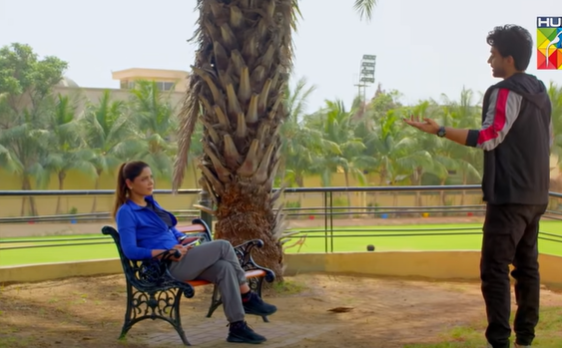“Dobara” is one of Hum TV’s most exciting shows – and Hum TV has some pretty great content at present. Written by Sarwat Nazir and directed by Danish Nawaz, “Dobara” stars the incredibly talented Hadiqa Kiani and Bilal Abbas Khan in lead roles. They are supported by Sakina Samo, Shabbir Jan, Nabeel Zuberi, Maheen Siddiqui, Usama Khan, Angeline Malik, Zoya Nasir and others. The first three episodes set the stage for the story’s foundation – and now with episode 4, Mehru and Mahir finally come face to face, kick-starting the basis of the story.
Hadiqa Kiani’s Mehrunissa is a refreshing heroine. She’s not only a woman finally coming out of Hidayatullah’s shadow after his death, but she’s also intelligent. She’s isn’t blind to her sister-in-law’s manipulations, making moves to thwart her plans while also putting her foot down as mother, despite Affan’s (Usama Khan) emotional blackmail. Still, Mehru has a lot on her plate and while she wants to live her life as she wishes, society will not allow her that freedom. Mehru shares the most beautiful relationship with her daughter Minal (Maheen Siddiqui), a young woman who loved her father, but also respects her mother as a person – and can appreciate seeing her happy.
Bilal Abbas Khan is simply fantastic as Mahir. Mahir has always desired, more than anything, love. He feels that love from Narmeen – and on this occasion, he also has the support of his parents. While Mahir is overjoyed at visiting Narmeen’s (Zoya Nasir) home for the proposal, his happiness is short-lived. His stepmother barges in, exposing Mahir for stealing her bangle and destroying the family reputation in the process. This is not only the last straw for Mahir’s mother (Angeline Malik) who declares her shame at being his mother, but it’s also the end of the relationship for Narmeen who has grown exasperated at Mahir’s immaturity. And while the audience can absolutely understand these emotions from Narmeen and even, on a level, Mahir’s parents, it’s also easy to understand where Mahir is coming from. Mahir is like an overgrown child acting out for attention, as he’s never had it from either parent. His pain is visible and it’s Bilal Abbas Khan’s performance that is making this character so relatable.
The highlight of episode 4 is the interaction between Mahir and Mehru. The foundation of a relationship is important not only for these two characters, but also for the audience in building a connection and desire to care about this potential relationship – and this is where “Dobara” more than succeeds with its writing. This is a connection that simply “clicks” straight away – not in a romantic sense, but as friends. While Mahir may be younger than Mehru, the two feel an instant comfort with one another and are able to share their problems openly.
“Dobara” is only four episodes in, but it has already set a benchmark of sorts regarding how such topics should be tackled. Despite being an emotionally complex topic, it is being handled with sincerity and with a touch of realism, its characters behaving in way where the audience can understand their actions and psyche. This is a must watch!
